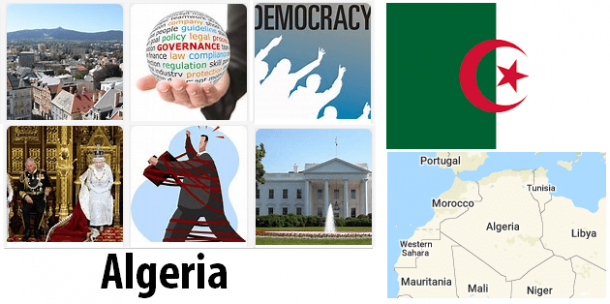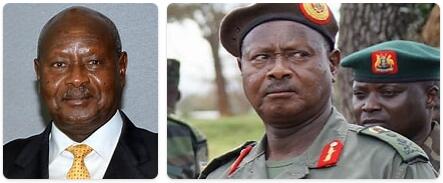Algeria Government and Politics
State and politics

GOVERNMENT
Until 1989, Algeria was a socialist people’s republic with only one permitted party, the Front de Libération National (FLN). The opposition that existed seemed underground or in exile. A state of emergency existed from the coup d’état 1965 to 1976 when a new constitution was adopted and elected parishes were established. The constitution adopted in February 1989, and subsequently substantially modified in a new referendum in November 1996, introduced in principle liberal and democratic freedoms and rights. However, parliamentarism is limited by the strong position of the presidential power, not least by the president’s appointment of one third of the 144 members of the otherwise indirectly elected first chamber which was introduced in 1996.
The number of members of Parliament’s lower house, the National People’s Assembly, was increased in 2012 from 389 to 462. The members are elected for five years in proportionate elections. The term of office in the first chamber is six years.
Presidential elections are held every five years. After a constitutional amendment in 2008, the president could be re-elected an unlimited number of times, which allowed Abdelaziz Bouteflika, president of 1999, to be re-elected in 2009 and 2014. A new amendment to the constitution in 2016 reintroduced the rule of a maximum of two terms of office for the head of state. In spite of this, Bouteflika was also thinking of running for the 2019 election, but after extensive popular protests he chose to resign in April 2019. All the presidents since independence have been men.
Policy
The political upheaval in the country began in 1988 when the then one-party government met with a comprehensive youth uprising that was channeled primarily to the 1989 Islamic Rescue Front (FIS). This party won the major local and regional elections in June 1990, and emerged as a dominant political force after the first round of the country’s first multi-party to parliament in December 1991. President Chadli Ben Djedid resigned in January 1992, the second round of the parliamentary elections postponed indefinitely and state of emergency was announced. An extended political crisis ensued. FIS was banned and many thousands of its members and sympathizers were imprisoned in camps set up in the southern desert areas. The attempt by the military leadership to restore legitimacy by appointing Muhammad Boudiaf (1919–92), a hero from the War of Liberation, who interim president failed when he was murdered in June 1992 by his bodyguard.
Increased violence on the part of various Islamist guerrilla groups and a stiff repression led to strong tensions in society. Only since Abdelaziz Bouteflika was elected new president in April 1999, a peace and reconciliation program containing offers of time-limited amnesty was formulated, which the Algerian people adopted in a referendum in September 1999. In another referendum in 2005, a general amnesty was approved – with some exceptions – for crimes committed by both sides during the civil war.
By quickly standing on the US side after the terrorist attacks there in September 2001, Algeria was able to begin to break the relative international isolation that the civil war and repression brought. Relations with the former colonial power of France have also been normalized.
Following the introduction of multi-party systems, FLN has dominated Algerian policy. In the 2002 and 2007 parliamentary elections, the party received 199 and 136, respectively, of 389 seats in the National Assembly, and in the 2012 elections 208 of 426 seats were conquered. President Bouteflika also represents FLN. The second largest party is FLN’s coalition partner Rassemblement National Démocratique (RND), which in the 2012 election received 68 seats in the lower house. In the 2012 elections, Islamist parties were allowed to stand again. Three such, among them the Algerian branch of the Muslim Brotherhood Mouvement de la Societé pour la Paix (MSP), formed the Alliance de l’Algérie Verte Alliance, which received 49 seats. FLN became by far the largest party in the 2017 election, with 161 out of 462 seats, while RND received 100 and MSP 34 seats. Of the members of the lower house, 119 (26 percent) were women.
The period after the election became politically messy. Prime Minister Abdelmalek Sellal surprisingly left his post at the end of May and was replaced by former Housing Minister Abdelmadjid Tebboune. After almost three months, Tebboune was also fired. New Prime Minister became RND’s leader Ahmed Ouyahia (born 1952), who thus assumed this office for the fourth time.
During his time as head of government, Tebboune announced that work and residence permits would be issued to African migrants located in Algeria without valid documents. It is estimated that in Algeria there will be about 100,000 refugees on their way to Libya and from there to Europe.
Bouteflika, who has been in the presidential post since 1999, resigned from the 2019 post and in the subsequent election, Abdelmadjid Tebboune won. The election was prompted by demonstrations and boycott calls, as all candidates had a background in the suspicious political elite. The protests have continued with demands for a new constitution and democratic changes.
Judiciary
The legal system in Algeria is deeply rooted in the French legal tradition, but much of French law has been replaced by its own national legislation. Islamic law is important in cases where there is no legal regulation. The death penalty remains in the legislation but is de facto abolished in 1993.
Human Rights
Algeria, throughout its history as an independent state, has had major shortcomings regarding fundamental human rights. The country still suffers from the violent conflicts that characterized the 1990s. Like many other countries in North Africa and the Middle East, protests against authoritarian rule have increased (see Arab Spring).
The most notable human rights issues in Algeria are the long wait for the trial of detainees, police brutality, corruption and lack of transparency. The lack of democracy is also an obstacle in itself.
Reforms on freedom of assembly and association that were initiated in the early 10s have, instead of a freer climate, led to additional restrictions according to Human Rights Watch. In 2012, the Algerian authorities continued to severely restrict freedom of assembly and block access to seats for planned demonstrations to prevent public protests, especially when the purpose of the demonstration was considered politically sensitive. Many human rights activists have been prosecuted.
Journalists cannot operate freely in Algeria. They can be sentenced to fines for criticism by the president and government institutions. Self-censorship is common. Reporters Without Borders placed Algeria in place in 119 of 180 countries in the Press Freedom Index in 2015, which is a marginal improvement from 2014.
Women are discriminated against in terms of marriage, divorce and inheritance law, even though the Algerian constitution prohibits gender discrimination and provides for equality in both civil and criminal matters. A woman’s marriage must be approved by a guardian. Violence against women is a widespread problem, rape in the home is not punishable and abortion is prohibited as long as the woman’s life is not in danger.
The civil war that started in 1992 left a large number of children in Algeria orphans. The country has failed to meet or live up to the Convention on the Rights of the Child and hundreds of thousands of children live on the streets in extreme vulnerability. Child abuse is not punishable within the home even if child abuse is prohibited by law. Algeria has major problems with extreme poverty and substance use among the country’s street children.
Homosexuality and bisexuality are prohibited and can be punishable by up to two years in prison and fines. Transsexuality is classified as a disease. The situation for LGBTQ people is still difficult as stigma, discrimination and violence are common.
The situation of refugees and migrants en route from southern and western Africa to Europe is difficult as they are treated inhumane by the orderly authorities. There are also reports of mistreatment in the refugee camps in the Algerian province of Tindouf, where 100,000 refugees live in isolation. Algeria is also a destination country for people who are smuggled for sexual exploitation.
Heads of State
| Presidents | |
| 1963-65 | Ahmed Ben Bella |
| 1965-78 | Houari Boumedienne |
| 1979-92 | Chadli Ben Djedid |
| 1992 | Mohammed Boudiaf |
| 1992-94 | Supreme Security Council |
| 1994-99 | Liamine Zeroual |
| 1999-2019 | Abdelaziz Bouteflika |
| 2019- | Abdelmadjid Tebboune |



